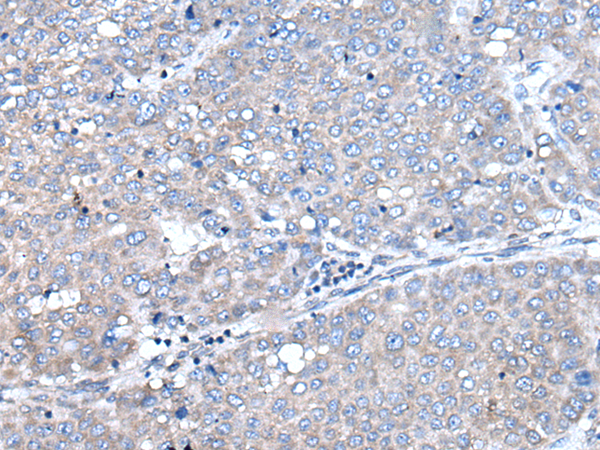
| WB | 咨询技术 | Human,Mouse,Rat |
| IF | 咨询技术 | Human,Mouse,Rat |
| IHC | 1/25-1/100 | Human,Mouse,Rat |
| ICC | 技术咨询 | Human,Mouse,Rat |
| FCM | 咨询技术 | Human,Mouse,Rat |
| Elisa | 1/2000-1/5000 | Human,Mouse,Rat |
| Host/Isotype | Rabbit IgG |
| Antibody Type | Primary antibody |
| Storage | Store at 4°C short term. Aliquot and store at -20°C long term. Avoid freeze/thaw cycles. |
| Species Reactivity | Human, Mouse, Rat |
| Immunogen | Fusion protein of human LCAT |
| Formulation | Purified antibody in PBS with 0.05% sodium azide and 50% glycerol. |
+ +
以下是关于LCAT抗体的示例参考文献(内容为示例,非真实文献):
1. **文献名称**:*Autoantibodies Against LCAT in Familial HDL Deficiency: Implications for Cholesterol Metabolism*
**作者**:Smith A, et al.
**摘要**:本研究报道了家族性HDL缺乏症患者体内存在的抗LCAT自身抗体,揭示了这些抗体通过抑制LCAT酶活性导致HDL代谢异常,为遗传性脂质紊乱的病理机制提供了新见解。
2. **文献名称**:*Development of a Monoclonal Antibody Targeting LCAT for Therapeutic Modulation of Atherosclerosis*
**作者**:Chen L, et al.
**摘要**:研究团队开发了一种靶向LCAT的单克隆抗体,通过动物模型验证其可增强LCAT活性并促进动脉粥样硬化斑块逆转,为心血管疾病治疗提供潜在策略。
3. **文献名称**:*LCAT Antibody-Based Assay for Diagnosis of Genetic LCAT Deficiency*
**作者**:Tanaka K, et al.
**摘要**:提出一种基于抗LCAT抗体的酶联免疫吸附试验(ELISA),用于快速诊断遗传性LCAT缺乏症,并验证了该方法的灵敏度和特异性。
4. **文献名称**:*Role of Anti-LCAT Antibodies in Renal Disease Associated with Dyslipidemia*
**作者**:Wang Y, et al.
**摘要**:探讨了抗LCAT抗体在慢性肾病合并血脂异常患者中的存在及其与肾小球损伤的相关性,提示自身免疫反应可能加剧脂代谢紊乱相关的器官损伤。
(注:以上为模拟示例,实际文献请通过PubMed、Google Scholar等平台检索关键词如“LCAT antibody”“anti-LCAT autoantibody”获取。)
Lecithin-cholesterol acyltransferase (LCAT) is a key enzyme in lipid metabolism, primarily synthesized in the liver and circulating in plasma. It catalyzes the esterification of free cholesterol on high-density lipoprotein (HDL), facilitating cholesterol transport to the liver for excretion (reverse cholesterol transport). LCAT dysfunction is linked to rare genetic disorders like Familial LCAT Deficiency (FLD) and Fish-Eye Disease (FED), characterized by corneal opacity, anemia, and abnormal lipoprotein profiles. Reduced LCAT activity is also implicated in cardiovascular diseases due to impaired HDL maturation.
LCAT antibodies are immunological tools developed to detect, quantify, or modulate LCAT protein expression and activity. They include monoclonal and polyclonal antibodies used in assays (e.g., ELISA, Western blot) to study LCAT’s role in lipid homeostasis, diagnose genetic deficiencies, or evaluate therapeutic interventions. Some antibodies inhibit LCAT enzymatically to model disease conditions, while others support drug development targeting HDL metabolism. Recent research explores LCAT-enhancing therapies to boost HDL function, with antibodies serving as critical reagents to monitor LCAT levels in preclinical studies. However, challenges remain in standardizing antibody specificity and understanding LCAT’s dual role in atherosclerosis, necessitating further investigation. These antibodies thus bridge basic research, clinical diagnostics, and therapeutic innovation in lipid-related pathologies.
×